A Seat at the Table

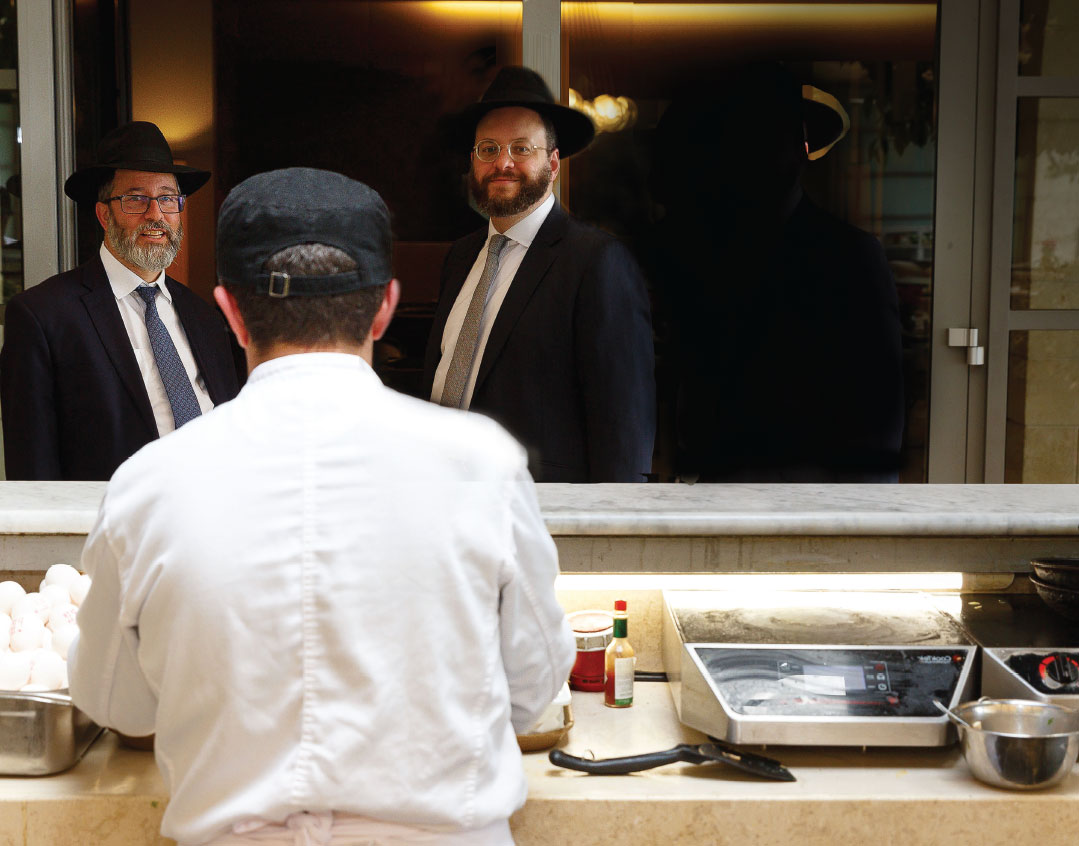
Elchanan Kotler
W
e’re standing outside Big Apple Pizza in Jerusalem’s Ramat Eshkol shopping center on this sun-drenched day, with Rabbi Shmuel Weiner and Rabbi Moshe Farkash of the ZNT Kosher Vaad Hakashrus.
The warm breeze carries the scent of spring — along with the aroma of hot pizza — and the restaurant sound system blares music from the old country.
Rabbi Farkash opens up the frozen dessert display next to the door.
“Even the ice cream in the freezer outside has to be checked,” he says, taking out a tempting prepackaged cone — chalav Yisrael, with a respectable mehadrin hechsher. He points out the other brands and flavors on offer, all of which are covered under Big Apple’s kashrus certificate, issued by his agency.
“These little things are important,” Rabbi Farkash emphasizes. “When Americans go out to a restaurant here, they just want to be able to eat. It’s hard for them to be on the lookout for things like this — ‘Wait a minute, nobody told me there could be a problem with the ice cream.’ ”
Rabbi Farkash is pointing out one common pitfall facing Americans in Eretz Yisrael planning to eat out: A restaurant’s kashrus certificate doesn’t necessarily guarantee every item sold in the store will be acceptable to every standard. While Israeli consumers are accustomed to maneuvering through the complex overlay of various hashgachos at different levels, Anglos can find it confusing.
Bridging such information gaps is what led Rabbi Shmuel Weiner — rav of Ramat Eshkol’s Zichron Nosson Tzvi shul (ZNT), and posek at the yeshivos Torah Moshe and Aderes HaTorah — to found ZNT Kosher Vaad Hakashrus three years ago.
“There came a point when many American rabbanim, as well as yungeleit, bochurim, and seminary students, realized they’re at a loss about the kashrus situation in Eretz Yisrael,” says Rabbi Weiner. “There was a demand for someone to get involved, to get answers and help people navigate the complex system here. The multitude of hashgachos, each with its own minhagim and hakpados, and the rapid, continuous changes in rules and standards make it a challenge to understand what meets normal American requirements.”
The ZNT Kosher Vaad Hakashrus mission is simple: to enable American residents and visitors in Eretz Yisrael to keep to the kashrus standards they adhered to in the United States. Aside from certifying a select group of eating establishments, the Vaad Hakashrus also maintains a spreadsheet of acceptable restaurants across the country, available upon request; monitors breakfast offerings at three Jerusalem hotels, in real time, with connections to the mashgichim there; supervises kashrus at private events; checks the status of kosher meals served on connecting flights to Israel; and serves as a clearinghouse for anyone seeking kashrus information about Israel, including such mitzvos hateluyos ba’Aretz as hafrashas challah and terumos u’maasros. In addition, ZNT Kosher is a member of the Association of Kashrus Organizations (AKO) — so far, the only member vaad in Israel. The staff tries to do all this with a customer service orientation that benefits both the consumers and the business owners.
“Young couples here are looking for places to eat,” explains Rabbi Farkash. “They’re away from family, they’re on shanah rishonah, the roof is leaking… This doesn’t happen in Kansas, right? We want to make things a bit more comfortable, so they can go out and have a nice dinner. They should be able to come in, see the teudah, and feel that they’re being taken care of.”
T
he demand for something like ZNT Kosher is longstanding. Rabbi Weiner — a Lakewood native married 25 years, who attended yeshivah in Staten Island and Fallsburg, and later the Mir and Toras Moshe — traces its roots back several years. The head of one of the yeshivos where Rabbi Weiner works had decided to determine definitively which Jerusalem eating establishments held to a level of kashrus appropriate for the bochurim.
This rosh yeshivah, who was knowledgeable in the laws of kashrus and supervision, went to a restaurant that was then popular among the American crowd and known to have a reliable hechsher. He came away very disappointed with what he saw and contacted Rabbi Weiner to see what could be done about the situation.
Rabbi Weiner himself went to the restaurant and asked the mashgiach there what hechsher was on certain vegetables; the mashgiach replied that he didn’t know. Rabbi Weiner asked him to go into the kitchen and find out. The mashgiach became uneasy at this and admitted he did not go into the kitchen as a matter of practice. Upon hearing this disturbing news, Rabbi Weiner contacted the restaurant’s owner.
“To make a long story short,” says Rabbi Weiner, “when I got permission to enter the kitchen and check the hechsherim on the products in the storage rooms, it became clear to me that the mashgiach had never been in some of these rooms.”
There were other deficiencies as well: The non-frum owner employed non-Jewish workers in the kitchen, the mashgiach did not have the keys to open and lock up the restaurant, meat was left to defrost overnight in open packages, and the liver was not being kashered correctly.
These findings led to investigations of other popular establishments, with similarly disappointing outcomes. As word began to get around, suddenly Rabbi Weiner was being bombarded with calls from several yeshivos and communal leaders demanding some kind of concerted action.
Answering the call of duty, Rabbi Weiner worked under the auspices of his Ramat Eshkol shul, Zichron Nosson Tzvi, where he’s been the rav for seven years. He began investigating restaurants and personally endorsing the ones he found were up to par, but he soon concluded that this approach was not thorough enough, nor did it keep sufficiently up to date. He ultimately committed to opening a full-service kashrus organization in 2016. That year, the brand-new ZNT Kosher Vaad Hakashrus gave full certification to two restaurants.
In 2017, as demand for services grew, Rabbi Weiner hired Rabbi Moshe Farkash — a Boro Park native and Beth Medrash Govoha alumnus, now at the Mir, married and residing in Ramat Eshkol — to “make seder.” With around 15 years of experience in food service, working for American kashrus organizations such as the Chicago Rabbinical Council, KAJ-Breuer’s, and Vaad of the Five Towns, Rabbi Farkash enabled ZNT Kosher to expand its services, add more restaurants to its certification, and begin offering up-to-the-minute information about kashrus at some Jerusalem hotels.
“We’re speaking for our kehillah, which is the Americans living here and their families and friends living abroad,” says Rabbi Weiner.
Both rabbis are quick to emphasize, though, that the Israeli mehadrin kashrus system is very strong, with excellent supervising agencies, and ZNT Kosher is not intended to supplant them in any way. Indeed, ZNT Kosher’s restaurant spreadsheet also recommends restaurants certified by these agencies. Rabbi Weiner and Rabbi Farkash hope to serve as a bridge between a public of consumers with specific standards, and the eateries who stand to benefit by being clued into those standards.
“We’re not in competition with any major existing kashrus agency,” explains Rabbi Farkash. “We usually go into a place that’s under a less mehadrin level of supervision and work with them to upgrade the products they use and how they prepare them.”
Rabbi Farkash relates an important bit of advice he and Rabbi Weiner received from Rabbi Sholem Fishbane of the Chicago Rabbinical Council: “Rav Fishbane told us: You want to be matzliach? It has to be kashrus without politics.”
With that directive in mind, ZNT Kosher decided not to minimize involvement with the Rabbanut, which is an arm of the Israeli government. Rabbi Weiner says their experience has shown that “there are people to work with” in the Rabbanut.
“For example, the regional supervisor in charge of mehadrin kashrus is probably our biggest fan,” says Rabbi Weiner. “He wants to work with us, he wants us to work with him. And if we work together, he can get us into more places.”
In fact, says Rabbi Weiner, ZNT Kosher certification for three restaurants in the Ramat Eshkol shopping center came about with the encouragement of the regional supervisor.
R
abbi Weiner and Rabbi Farkash find that their job often involves kashrus education for both American consumers and Israeli businesses. On the consumer side, they say chutznikim sometimes hold cherished beliefs about favorite eateries that keep them from investigating as much as they should. On the Israeli side, the restaurant business is filled with people whose attitudes about kashrus were informed more by fuzzy “traditions” than by solid halachic instruction.
“Some Americans come to certain restaurants in Eretz Yisrael based on what they remember from ten or fifteen years ago,” says Rabbi Weiner, “but things have changed.”
Older family members might recall eating at a certain restaurant that everyone at the time believed was acceptable, even in the absence of documentation. Whatever the case, Rabbi Weiner emphasizes the importance of getting accurate, up-to-date information. And that involves something beyond peeking through the window and seeing who eats there.
“Rabbi Fishbane mentioned in his speech at the AKO convention that there’s a famous hechsher called EEIK – ‘everyone eats it’ kosher,” says Rabbi Farkash. “People will see a guy with a long jacket eating in a place and assume it must be kosher.”
While this creates a problem for the potential American customer, it also presents a stumbling block to the Israeli restaurant owner. If he looks out across his dining room and sees he already has a mehadrin crowd, why should he take the trouble of getting an actual mehadrin hechsher? In Israel, says Rabbi Farkash, every restaurateur thinks he’s a kashrus expert. It’s a phenomenon he calls “gam ani dati (I’m also religious).”
“The problem is like this,” explains Rabbi Farkash. “A lot of these people grew up frum. And even if they’re not frum today, they grew up knowing what kosher is. A head of a big US kashrus organization told me the hardest business owners to give kashrus to in America are non-frum Israelis and frum Israelis. They both grew up in an environment where everything’s kosher.”
American frum Jews, however, are used to being the only ones on a flight or in a meeting who eat kosher, so their sensitivity level is turned up a notch. Rabbi Farkash says when he does private events for Americans in Israel, the Israelis come up to him and ask, “Lama yesh lecha kol kach harbeh nervin?” (Why are you such a bundle of nerves?)
“We have to be very strategic about how we put Israelis in the box of our rules,” says Rabbi Farkash. “They’ll say, ‘I went to yeshivah. I’ve done it 15 years my way.’ I tell them, ‘I agree, but my kehillah is makpid on certain things, and my rav is makpid that only the mashgiach washes the lettuce.’ I’ll explain that these are our protocols. And the mere fact that people want to eat out at more places doesn’t mean I have to cut corners. I’m happy to work with you and figure out a substitute product. A lot of products out there are obtainable with a reliable hechsher. A bit more expensive, but for two or three shekels more, the Americans will pay it.
“But when they get into a discussion of gam ani dati, that’s a discussion you can never really win. So I just tell them, look, this is what the kehillah wants, this is what the rav decided. It will really pay off in the long run.”
E
very kashrus agency has its enforcement mechanisms, as well as its monitoring methods. These are halachic necessities: Kashrus ultimately operates on the basis of mirtas — fear. The Israeli mehadrin kashrus agencies employ mirtas very effectively. It is said that Rav Landau, who was just niftar two weeks ago, warned all the establishments under his supervision that if he caught someone violating his rules even once, that business would be permanently removed from his hashgachah.
“The validity of any hechsher is based on how afraid either the mashgiach or the owner is to do something wrong,” says Rabbi Weiner.
ZNT Kosher employs a number of strategies to implant that basic fear. Except in very limited circumstances, ZNT Kosher requires the physical presence of a mashgiach — someone on the premises assigned tasks during business hours such as ensuring leafy vegetables are bug-free, performing hafrashas challah on dough that will be baked, and, if non-Jews are employed in the business, preventing any situations of bishul akum.
The mashgiach is also responsible for checking deliveries and receipts for all food products brought onto the premises. This aspect of kosher supervision is fraught with potential for mishaps.
“There are usually mistakes with deliveries,” says Rabbi Farkash. “A restaurant orders tuna in bulk — the supplier produces two different lines of tuna under separate hashgachos, but they both come in the same kind of can. The supplier runs out of the one the restaurant needs, but only figures this out at four in the morning. He’s not going to call the restaurant about it at that hour, so he just automatically substitutes the other.”
Rabbi Yehuda Zdanowitz, who joined ZNT Kosher in February 2017 and will be leaving after Pesach to pursue other opportunities, elaborates on other complications involved with checking deliveries.
“All the vegetables are included under this,” he says. “Also all the spices have to be delivered in sealed containers. If a restaurant is selling prepared products, we have to make sure, for example, that the milchig products are labeled properly and have a proper separation from the pareve products. Bagel chips are hamotzi — that should be indicated on the label. The mashgiach has to be on top of all these labeling issues.”
Restaurants with the ZNT hechsher are also required to install security cameras, which Rabbi Farkash can check remotely. And Rabbi Weiner and Rabbi Farkash make frequent unannounced visits during the course of each day to instill that fear in both the owner and the mashgiach. If a mistake somehow slips through all these layers of prevention, the owner faces a financial penalty.
“We have a knas system in place,” explains Rabbi Farkash. “If anyone besides the mashgiach washes the lettuce, he gets the knas. Two of the places we’re supervising have other locations that are not under our hechsher. If they bring anything in from the other branches — even bagels that are otherwise perfectly fine — they’ll get a knas.”
Rabbi Weiner and Rabbi Farkash work hard to buttress that element of fear with the additional motivator of mutual respect.
“If an owner is scared of you, he won’t switch out a mehadrin product for a cheaper, inferior substitute,” says Rabbi Farkash. “Also, if you respect him, and he respects you, he won’t want to do anything to disrupt that relationship. Now, things happen b’shogeig [inadvertently]. But if there’s respect, he won’t intentionally want to do something wrong. I think it’s kind of a chiddush for them. We say, ‘We’re not here to tell you how to run your business — we’re just here to work together with you.’ It’s an eye-opener for them.”
Answering Your Questions
The staff at ZNT Kosher Vaad Hakashrus is reachable at zntkosher@gmail.com and will try to respond to e-mailed queries within 24 hours. The staff will answer inquiries regarding:
- the vaad’s standards and practices
- which restaurants in Israel are recommended
- specific hotel breakfast items
- the status of kosher airline meals on connecting flights to Israel
- kashrus issues specific to Israel
KASHRUS IN ACTION
Customers Appreciate the Style
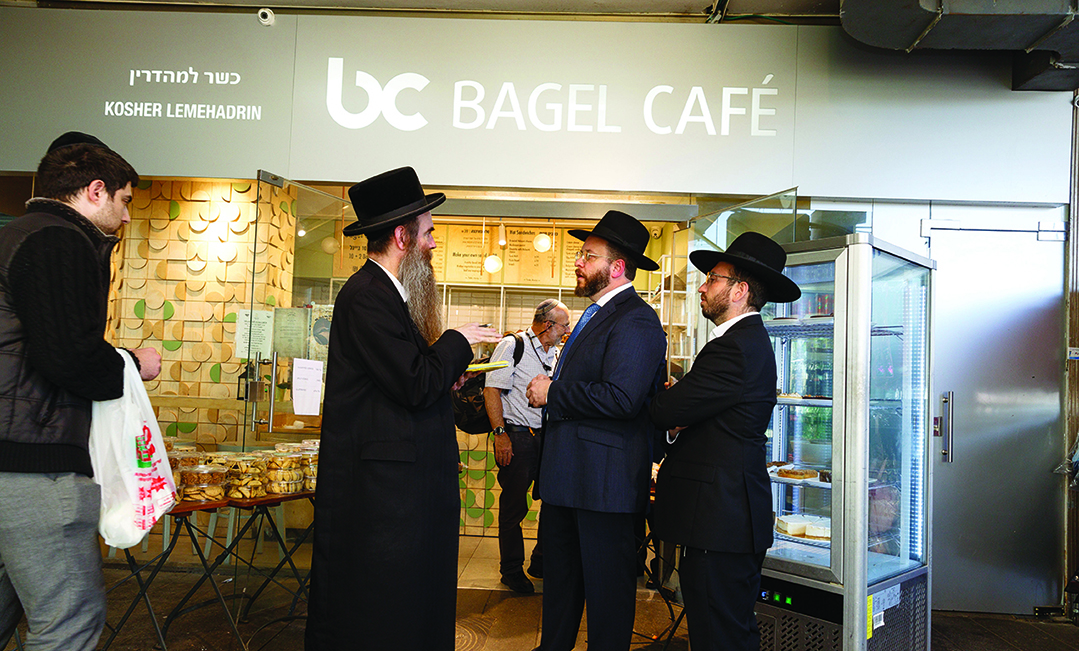
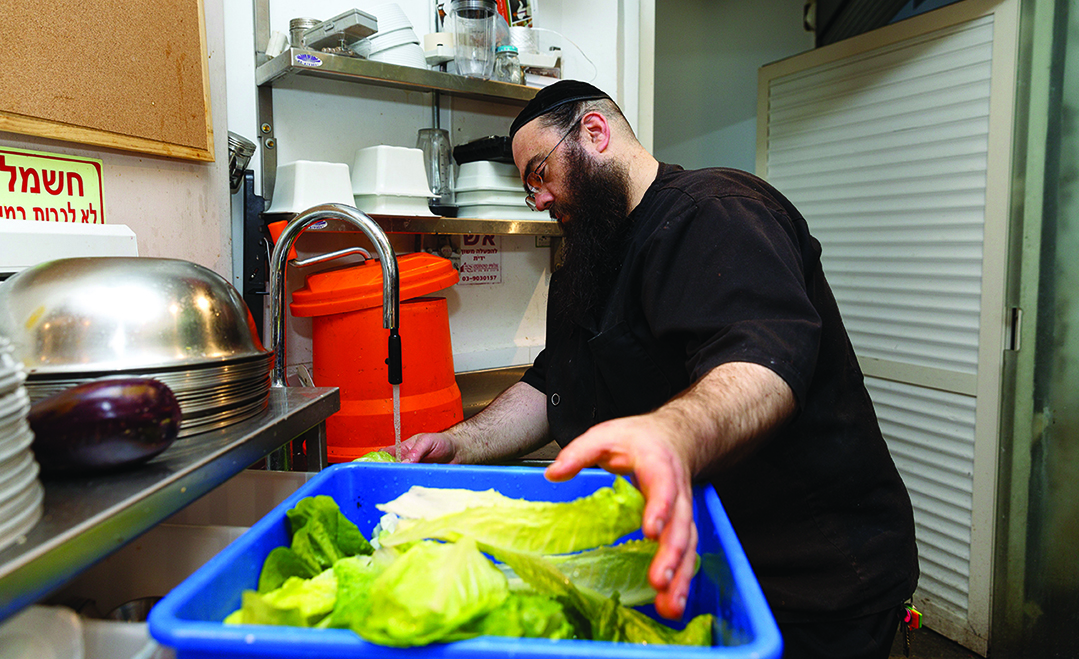
W
hen the BAGEL CAFÉ signed up to be one of the first establishments to come under formal supervision by ZNT Kosher, each party knew it was taking a chance on the other. The relationship has blossomed, and now each side regards the other as a success story.
“When we sat down with the owners, one said, ‘90 percent of our business is from you,’ ” recounts Rabbi Farkash. “Now maybe she shouldn’t have said that, but I’m not looking to take them for a ride. When I lay out for them the costs of pikuach and the mashgiach, they don’t have questions.”
As Rabbi Farkash takes us behind the counter, we meet the mashgiach, Reb Shaya Goldsmith from Manhattan’s East Side, examining lettuce. He’s been working here 13 months, and likes what he sees so far. “Customers appreciate the American style and the American efficiency,” he says.
Rabbi Farkash opens the orange juice machine to reveal a small screen at the mouth of the dispenser, installed to prevent the bugs sometimes found on orange peels in Eretz Yisrael from getting into the juice. As we continue into the back, he points out the security cameras. Opening the storage units, he shows us the hechsherim on all the neatly stacked products inside.
One of the owners of the Bagel Café, Eli Barhoum, comes over to greet us. “Rabbi Weiner is already like part of the family, and he’s the head of a beautiful kehillah,” says Eli. “Very good people.”
(Rabbi Farkash mentions that the previous week he and Rabbi Weiner had gone to be menachem avel for Eli, who had lost his father. Rabbi Weiner told Eli that he himself had lost his father five years ago and told Eli to please call if he wants to talk.)
Pizza Party
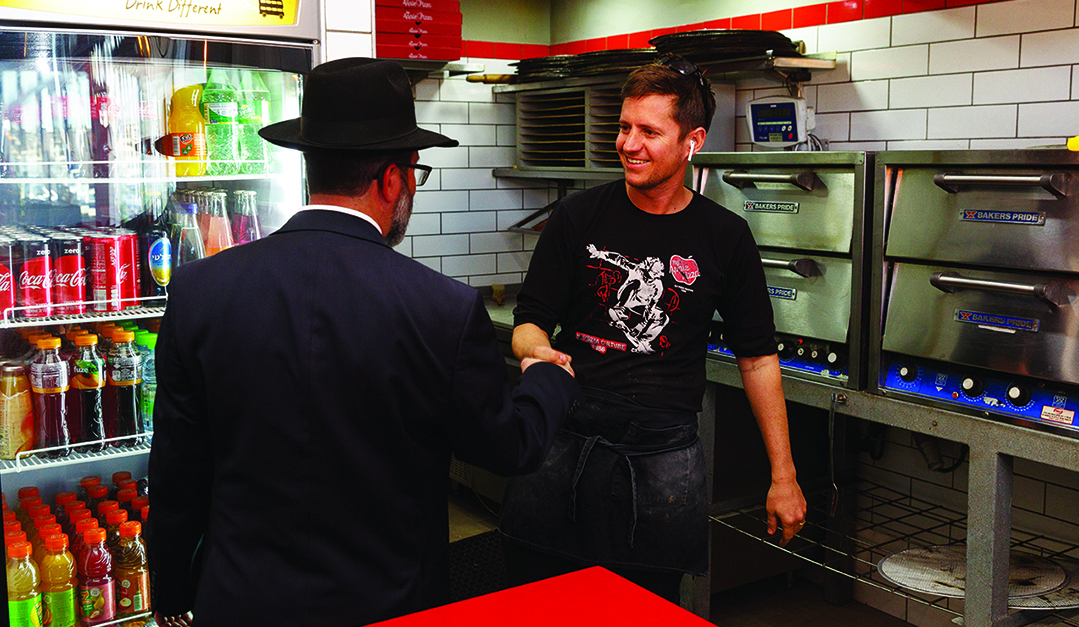
A
chikam Kaufman, the owner of BIG APPLE PIZZA, along with his employees on duty, warmly greet Rabbi Farkash and Rabbi Weiner. The pizza store is smaller than Bagel Café, but nevertheless possesses cameras. The products inside are neatly stacked and arranged to display their hechsherim. Achikam is in a joking mood as he speaks with us.
“We know Rabbi Weiner about three years, it’s been great. They come all the time, they check — not like the Rabbanut! It’s been fantastic for business. Before they came, we just didn’t have business like this.”
The admiration is mutual.
“He’s a great owner about obeying the rules and working with us on everything,” says Yehuda Zdanowitz. “Great to work with, very easygoing. He came to my chasunah, his mother made a Shabbos hotplate cover for me.”
But It Tastes Better This Way
O
ur next stop is a shawarma shop that is not yet under ZNT Kosher supervision but is eagerly angling for it. The owner greets us warmly and offers cold drinks on the house. (The only taker is Mishpacha’s faithful correspondent. Rabbi Farkash explains he doesn’t want to feel beholden for accepting freebies.)
The restaurant is clearly gearing up, and as the owner takes us on a tour, he enthusiastically points out the steps he has taken or is preparing to take. Rabbi Farkash nods politely and leans in for a quiet word when the owner is out of earshot.
“There are a couple things he’s going to have to cut out of the menu because we can’t find a good hashgachah on the products he uses,” Rabbi Farkash says. “For some of the Sephardi dishes, if we can’t find the products with a reliable hechsher, then he’s either going to have to make those in-house or he’s going to have to eliminate them.
“I took a hard line. He said to me, ‘But every week I have this old lady who comes to me for stuffed grape leaves.’ I told him, you’re going to have to find grape leaves grown hydroponically or cut it out. I feel bad for that lady, but these are the standards of the hashgachah.”
As we move through the kitchen toward the storage area, Rabbi Farkash gestures at the appliances that will have to be discarded and the others that will have to be blow-torched. The owner is about to open the fridge when Rabbi Farkash suddenly stops at a huge metal drum.
“This is leftover oil — I have no idea where this came from,” Rabbi Farkash explains. “We come across this all the time. With the hotels, at Pesach time, whatever oil is left in the grease trap is treif. So what happens? They come to pour out oil into the drum, and they lean the hot pot on the side of the drum.”
Fortunately, Rabbi Farkash has already spoken to the owner about proper oil disposal, so he will not face the scenario of having to kasher a pot that was hot and came into contact with oil of unknown origin.
“They’re going to start leaving the oil to cool overnight and pour it into the drum in the morning,” says Rabbi Farkash. “It’s really about the details. I don’t know if their other hashgachah ever looked into this.”
At the meat refrigerator, the owner stages an impassioned defense of broiling his liver himself, insisting it’s “yoter ta’im,” tastier. Rabbi Farkash again nods politely, but with a slight gesture indicating that the discussion has already been closed on this item: For this restaurant to receive the Vaad Hakashrus hechsher, the liver must be broiled only by a knowledgeable, experienced person aware of all the halachos.
No Competition
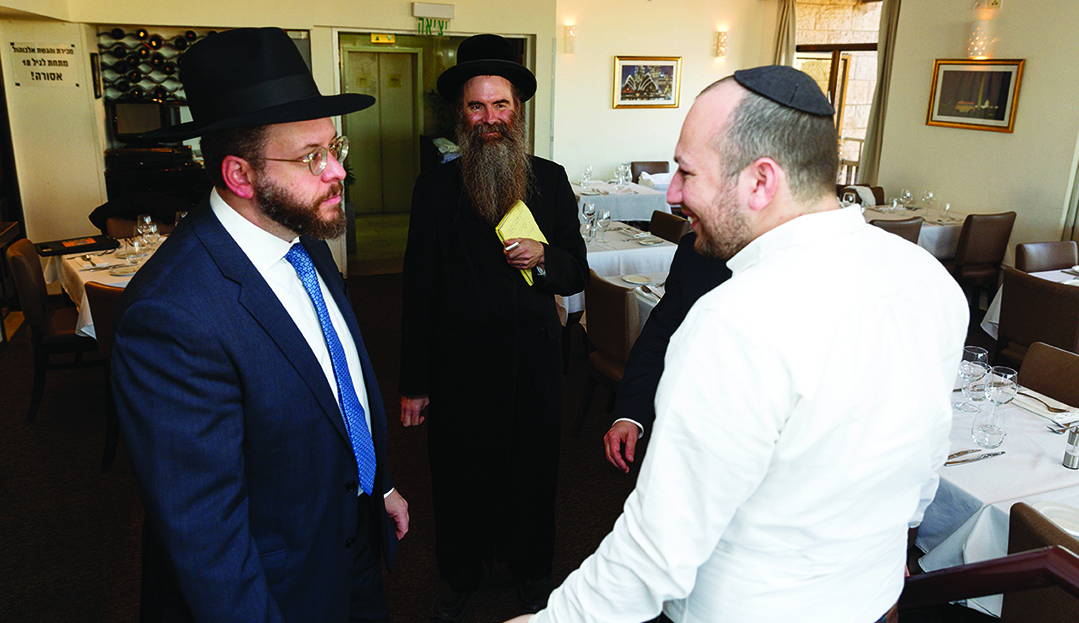
The next stop on the tour brings a considerable change of pace. We get off the elevator at the top floor of the Jerusalem Gardens Hotel and enter the SKYLINE RESTAURANT. Tables are being set for the dinner service and the cocktail bartender is stocking his cabinet.
Eli Berger, the manager, warmly greets Rabbi Weiner and Rabbi Farkash. He brings us over to a bank of windows that give an expansive view of the cityscape at sunset as he shows us the pictures on his phone from the previous day’s visit by Prime Minister Netanyahu to the hotel.
When someone remarks that this VIP visit is what gives this establishment a leg up on the competition, Eli counters, in a matter-of-fact tone, “We have no competition.”
The head chef, Daniel Aviv, a tall, gregarious man, emerges to bring us on a tour of the kitchen. He lingers by the meat refrigerator, displaying various cuts of beef with a very respectable hechsher.
Rabbi Weiner recounts the early days of ZNT Kosher’s supervision here, during which there were heated discussions about the standards. Everyone is all smiles now.
“For sure it’s a challenge, it’s not easy,” says Daniel Aviv about keeping to a mehadrin level. “But the standards of kashrus go together with the quality of food, and we are committed to the highest levels of both.”
“We’re happy to work with them,” says Eli of the ZNT rabbis. “We like the community. We like to see the couples coming with their parents and their entire families. They’ve brought in enough business.”
Rabbi Leib Shmuel Yager, supervising the other mashgichim on duty, points out the station where leafy vegetables are inspected for bugs and informs us that the same spotlights that illuminate the exterior of the hotel at night are used to check the lettuce in the kitchen.
“The system we work with here is good,” Rabbi Farkash says after we leave. “They’re very good. If I come in and I feel that they’re reliable, then that’s it. We just do a little bit more of our detailing. The infrastructure is already in place, we just have to quietly tweak it. You have to build relationships.”
Who’s the Boss
O
ur final stop is the world-class DAVID CITADEL HOTEL, a stone’s throw from the Old City walls. Here ZNT Kosher is relying on the expertise of an outside mashgiach, Rabbi Yosef Lishner of the Rabbanut. But the objective here is different: ZNT Kosher is not providing hashgachah on this luxury hotel, but rather soliciting information. Rabbi Weiner and Rabbi Farkash want to be able to tell American guests who keep a high level of kashrus which foods they can eat at the hotel’s sumptuous complimentary breakfast buffet.
It may seem strange for ZNT Kosher to be working with a mashgiach from the Rabbanut for purposes of ascertaining which food items have been prepared to mehadrin standards — but a few minutes talking to Rabbi Lishner should clear that up. A tall, imposing figure with a deep, resonant voice, Rabbi Lishner leads us into the vast kitchen complex below street level in the hotel.
“When you’re setting up kitchens like this, you have to design it so it’s impossible for a dish to leave its assigned area — a milchig bowl could never even enter the fleishig kitchen,” Rabbi Lishner intones. His hand sweeps over the entire layout, charting the route a dish takes through this factory-like setting. “So the fridges and freezers are here, the food is being cooked here, and the pots and pans are being washed here. It’s all processed in a big circle, and the milchig and fleishig circles don’t overlap.”
He points out big stainless-steel dish depositories, where the dirty china is brought after each meal; from here, the utensils are taken to be washed. Although the fleishig kitchen is at the opposite end of the complex from the milchig kitchen, nevertheless there are big metal flaps covering the fleishig dirty dish depository as the milchig breakfast dishes are being cleared. Even in the unlikely event a milchig dish were to somehow find its way all the way down here to the fleishig end, there would not be anywhere to physically set it down.
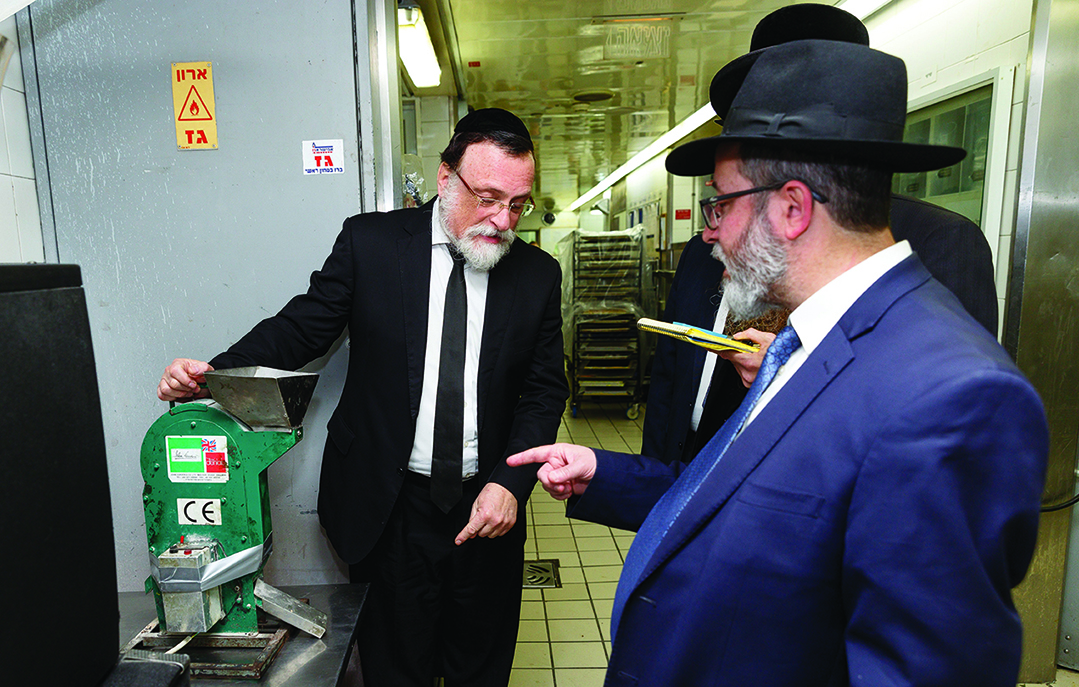
Rabbi Lishner — a Lubavitcher who learned in Ponevezh — helped design this setup when he worked with the hotel on its opening 21 years ago. Rabbi Farkash says the forethought and diligence that went into this kitchen operation are what qualified it for consideration by ZNT Kosher. “The system is very, very tight,” he says.
The arrangement between Rabbi Lishner and Rabbi Weiner and Rabbi Farkash is mutually beneficial. Rabbi Weiner had long been getting calls from travelers wanting to know which hotel breakfast menu items were acceptable; Rabbi Lishner had long been answering queries from curious guests. Rabbi Farkash had to overcome Rabbi Lishner’s initial suspicions about ZNT Kosher’s intentions — but he was able to quickly clear the air by promising to reduce the 15 questions Rabbi Lishner received from guests daily down to two or three.
“I’m only suggesting to people what might be okay for them,” Rabbi Farkash says. “I’m trying to answer the questions that would otherwise go to Rabbi Lishner.”
“The bottom line is, the mashgichim don’t get a commission for people staying in the hotel or eating in the restaurant,” says Rabbi Lishner. “There’s no nogeia b’davar here. I don’t care either way. I’m very happy to have their help.”
Rabbi Lishner leads us through the restaurant where the buffet has been set up — and since the area is so large, it turns into a lengthy stroll. Rabbi Farkash points out the items that meet American yeshivaleit’s standards — the bagels, one of the two loaves of bread, two of the three hard cheeses.
“The important thing to consider here is the mashgiach’s position in the organization,” Rabbi Farkash says. “Some hotels don’t give the mashgiach a lot of authority. Kashrus is subordinate to other concerns. But the David Citadel appointed Rabbi Lishner to a position with a lot of authority. The teudah might say Rabbanut, but it’s really Rabbanut Mehadrin-plus-plus-plus.”
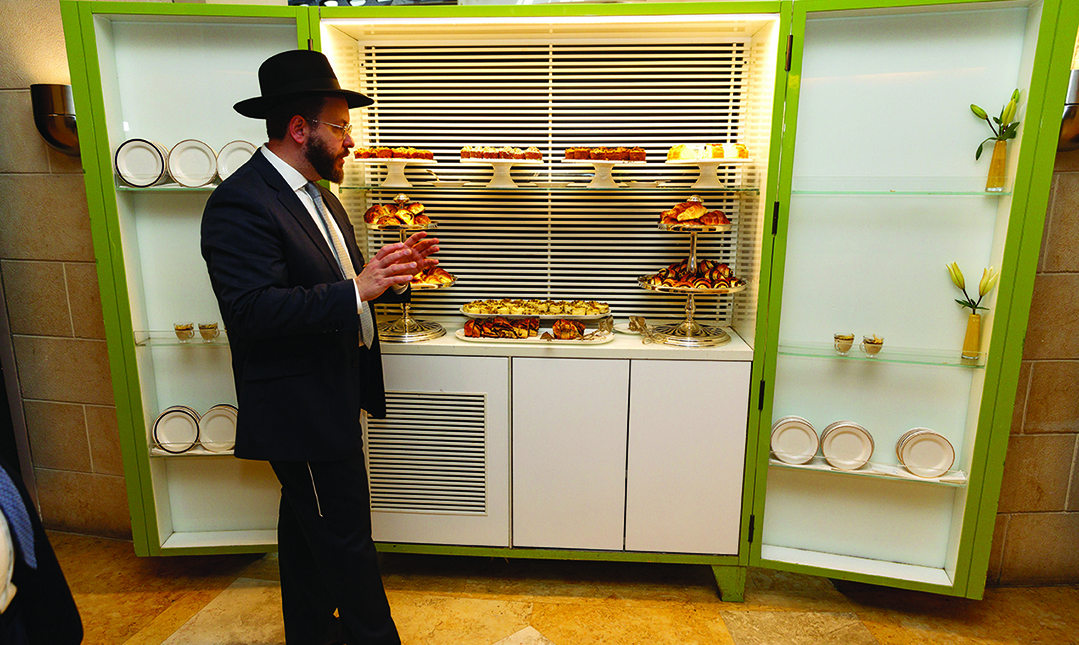
Rabbi Weiner and Rabbi Lishner are conversing on the side about Pesach preparations. Rabbi Lishner expounds at length about the chumras he is undertaking, and Rabbi Weiner is duly impressed.
“You’re wondering why I’m doing all that, even though I’m Rabbanut,” Rabbi Lishner says. “It’s because of the Shulchan Aruch.”
“Good answer,” says Rabbi Weiner.
Rabbi Lishner ponders this a moment and then points out that strictly holding to the Shulchan Aruch leaves no gray areas, especially when it comes to food production that is mechallel Shabbos, or issurim in proportions greater than one in sixty.
“It’s all black or white. You could end up throwing away a lot of food because of kashrus. And I would throw it away, because everyone knows already we’re not playing games,” Rabbi Lishner declares. “It raises the whole level. You could end up throwing out the entire lunch the kitchen staff prepared because of a kashrus mistake. No playing games.”
“This is really where it’s at, with the koach of the head mashgiach,” interjects Rabbi Farkash. “I’m sure he’s done it many times to build respect for keeping to a higher level. What you’re seeing here is not so common.”
“I’ve never seen him do it,” pipes up Avi Katz, an American chef now living in Ramat Eshkol. “He’s never had to do it since I’ve been here. Because it’s not an issue anymore.”
“It only happens once or twice a year now,” concurs Rabbi Lishner. “You heard the story of the balagoleh and the donkey? In a small shtetl, a balagoleh would drive people with his wagon and donkey to the train station in the big city. It was a regular route, a boring routine, the balagoleh took up drinking. Meanwhile the donkey learned the stops, learned the train schedule. Soon he was even taking people’s money and making change.
“Every Rosh Chodesh, the balagoleh would take his stick and beat the donkey. Finally the donkey asked him, ‘Listen, I’m the one running your business over here. Why are you beating me?’
“ ‘Ah,’ answered the balagoleh, ‘I don’t want you to start thinking maybe you’re the boss and I’m the donkey.’
“So, once in a while you have to throw away food so no one forgets the rules.”
Give them More
B
ased on the continuously increasing demand for its services, it seems that the ZNT Kosher staff will have plenty to do for the foreseeable future. Although they have made forays into food factories to check out specific products, there are no plans currently for ZNT Kosher to begin offering a product line under its hechsher. For now, the focus will remain on certifying select eating establishments and providing kashrus information.
“Rabbi Weiner’s goal is to have ten places plus more hotels, to offer variety, and I think from there it will grow organically,” says Rabbi Farkash. “Rav Dovid Cohen of the CRC told us our goal is that there should be more kosher food for people to eat.”
Besides meeting that goal, the hashgachah is making another important mark on the local religious landscape whose long-term effects will be seen with time. In many of the restaurants and establishments ZNT supervises, some of the less-knowledgeable employees undergo a religious awakening when they are taught the laws of kashrus. Rabbi Farkash has seen people take on Shabbos observance as a result.
“I think people appreciate the sincerity,” says Rabbi Weiner. “Sincerity comes in different forms, and we’re putting it out in the form of kashrus.”
“We’re trying to build a family here,” Rabbi Farkash sums up. “I think business owners and supervisors of other hashgachos respect what we’re doing. We’re trying something a little different, and b’ezras Hashem we’ll be matzliach.”
(Originally featured in Mishpacha, Issue 757)
Oops! We could not locate your form.













